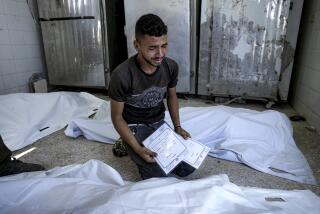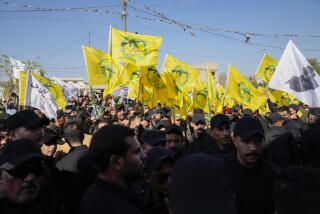Iran reaffirms support for Syria’s Assad; U.S. warns of proxy war
BEIRUT — Iran’s top security official on Tuesday reaffirmed Tehran’s support for Syrian President Bashar Assad as the United States warned of a potential proxy war in Syria and an influx of terrorists to the strife-torn nation.
Iran’s security chief, Saeed Jalili, met in Damascus with Assad, who appeared on state television for the first time in two weeks. His absence had spurred rumors that Assad may have left the Syrian capital amid soaring violence and after a bombing last month killed four of his top aides.
Assad told the Iranian official that “foreign powers” were supplying “terrorists” with weapons, a clear reference to U.S. allies such as Saudi Arabia, Qatar and Turkey, which have provided aid to rebels seeking to overthrow Assad’s government.
On a visit to South Africa, U.S. Secretary of State Hillary Rodham Clinton was also warning about terrorist infiltration of Syria and interference by outsiders.
“Those who are attempting to exploit the misery of the Syrian people, whether by sending in proxies or sending in terrorist fighters, must recognize that that will not be tolerated,” the top U.S. diplomat said.
Clinton did not specify what nations or groups were fomenting strife in Syria. Later, a State Department spokesman, Patrick Ventrell, also did not offer details when asked about Clinton’s comments.
“We’re talking about the type of extremists and terrorists that would throw further fuel on the fire and kill more innocent Syrians,” Ventrell told reporters in Washington.
Western officials have expressed concern about an influx of Islamic militants to fight alongside Western-backed rebels seeking to oust Assad.
Iran and its Lebanese ally, Hezbollah, both staunch supporters of Assad, have consistently denied providing any military assistance to the Syrian government.
However, rebels in Syria have long accused Iran and Hezbollah of providing aid to Assad.
The United States has publicly assailed what it calls Tehran’s “destructive behavior” in Syria.
Over the weekend, a rebel brigade said that 48 Iranians captured Saturday by insurgents near Damascus were militiamen on a “reconnaissance mission.” The rebels threatened to execute the captives.
Iran says the captives are religious pilgrims, and it has demanded their release.
On Tuesday, Iran called on the United States and other nations backing the Syrian opposition to use their influence to win the freedom of the Iranians.
“Kidnapping innocent people is not acceptable anywhere in the world,” Jalili, who is also Iran’s top nuclear negotiator, said in Damascus. His visit to Syria appeared to be part of a diplomatic offensive by Tehran aimed at freeing the captives.
U.S. officials don’t know who the captured Iranians are, State Department spokesman Ventrell said.
It is unclear whether the Syrian rebel group has made any demands in exchange for the release of the Iranians. A posting on a rebel social media site indicated that three of the captives were killed this week in government shelling, but that report remained unconfirmed.
In another effort to help secure the release of the captives, Iranian Foreign Minister Ali Akbar Salehi arrived Tuesday in Ankara, Turkey, for talks with his Turkish counterpart, Ahmet Davutoglu. Iran is seeking help from Turkey and Qatar, major backers of the Syrian opposition.
Special correspondent Ramin Mostaghim in Tehran contributed to this report.
More to Read
Sign up for Essential California
The most important California stories and recommendations in your inbox every morning.
You may occasionally receive promotional content from the Los Angeles Times.










